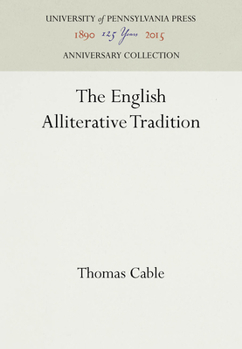The English Alliterative Tradition
The meter of Middle English alliterative poetry, Thomas Cable contends, holds the key to a reinterpretation of both Old English meter and iambic pentameter, which in turn provides a new understanding of Middle English meter itself. Drawing upon recent insights in linguistics, Cable articulates a revolutionary theory of rhythm in English poetry from its beginnings through the Renaissance and beyond.
Cable's discussion moves from the rhythms of Old English poetry and prose to the poetry of Chaucer and the Alliterative Revival, to Shakespeare and T. S. Eliot. He demonstrates that Middle English poetry does not show the continuity of tradition that standard authorities have asserted. With the Norman Conquest of 1066 came a clear break, and what followed was a drastic misreading by the poets of what had come before. Throughout the book, Cable constantly asks fundamental questions regarding the intentions of the poet, the impact of the perceived metrical tradition upon that poet, and, with reference to Peircean abduction, the possibility of constructing any metrical theory, especially one from the distant past. The answers and their implications--metrical, cognitive, and philosophical--provide the foundation for a new understanding of the creation and evolution of English versification from the seventh century to the present. The English Alliterative Tradition is a major and controversial study in medieval English poetics that illustrates and clarifies key ideas of the New Philology. It will be of interest to scholars and students of Old and Middle English, prosody, and historical linguistics.Format:Hardcover
Language:English
ISBN:0812230639
ISBN13:9780812230635
Release Date:July 1991
Publisher:University of Pennsylvania Press Anniversary
Length:192 Pages
Weight:1.20 lbs.
Dimensions:0.5" x 6.1" x 9.2"
Grade Range:Postsecondary
Customer Reviews
0 rating





